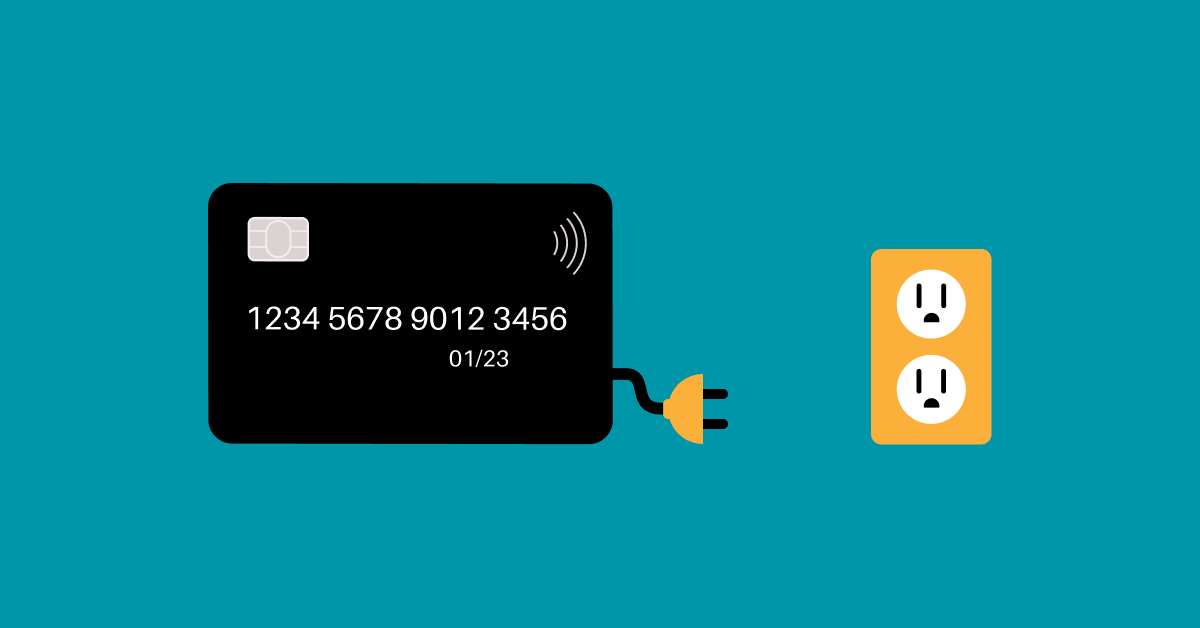
Some of the most difficult challenges to tackle as a business owner are those that are out of your control. Credit card processing outages fall into that category, and can turn a normal day into a frenzied one.
Efficiency and strong customer service are two factors that are top of mind for business owners, so a payment processing outage can throw all your operations out of whack. Luckily, there are steps you can take to address such an outage to prevent it from having a prolonged negative impact on your business and customer base.
In this article, we’ll talk about the following:
- What is a credit card processing outage?
- How does an outage impact your business?
- Why do processing outages happen?
- How to deal with credit card processing outages
Find the best payment processing solution for your business
Not sure where to start? Check out our guide to choosing a payment processor.
What is a credit card processing outage?
Credit card processing is the system in which data from a customer’s card is transmitted to allow a certain amount of funds to be transferred from their account to the merchant’s account.
When an outage occurs, this system is disrupted and payments can’t be processed.
According to the Bank of Canada, around 30 million financial transactions take place in Canada every day. The sheer volume means there is bound to be payment processing issues from time to time.
Most days, you won’t run into any hiccups processing your customers’ orders. But on rare occasions, your credit card processing system can stop working, rendering you unable to make sales. Often, the cause isn’t clear, so you have to get to the root of the issue right away.
How do credit card processing outages affect your business?
Payment processing outages can present a huge dilemma for merchants. Aside from losing out on sales, these outages can impact the credibility of your business among customers.
Depending on the nature of your business, a credit card processor outage can have varying levels of impact. For example, if you operate a restaurant and an outage occurs in the middle of the dinner rush, it will present a whole host of short-term problems.
If multiple customers are waiting to pay their checks, it will cause a backlog. Most customers probably won’t have cash on hand either.
You’ll likely be able to resolve the issue quickly—unless it’s entirely out of your control due to a power outage—but it’s the last thing you want to encounter on a busy night. Here are just a few ways an outage can impact your business.
Lost revenue
Hopefully you never have to deal with lost revenue as a result of a processing outage, but it’s something you have to prepare your business for.
Business owners often have to resort to accepting cash only when their payment processing systems malfunction. This can result in a loss of sales and potential profit, even if the outage persists for only a short period of time.
Since cash is increasingly falling out of favor, a trend that’s accelerated in the past few years, you have to be prepared for customers to turn away from your store to shop elsewhere.
For perspective, Canadians made $591 billion in credit card purchases in 2021, compared with $58 billion in cash.
Depending on when the outage happens, your business could lose anywhere from a whole day’s worth of revenue or an hour’s worth. Keep reading to learn about how you can minimize this loss.
Lost customers
No business would willingly send a customer into the arms of another store. But unfortunately, that’s what an outage can do—if there’s no way for them to pay at your store, they will simply take their business elsewhere.
Whether the outage affects your in-person store, your online store, or both, customers may leave after failing to place an order. The customer may find what they need at another business and it’s possible they won’t return to your store in the future because of their bad experience. Building a loyal customer base is crucial to a successful business, so anything that tarnishes that reputation can prove costly.
Impact on your reputation
Customers who went to your store looking to make a purchase may leave feeling disgruntled by the outage. Even though it’s out of your control, such an event can leave customers with a bad impression of your business.
The customer experience is top of mind for all merchants. And when there’s an inability to deliver, it can negatively affect your business ratings and reputation.
Impact on your operations
A credit card processing outage will throw a wrench in your business’s daily operations. You’ll have to find ways to minimize the damage, and that can slow down the way you handle your business that day. If you can’t process sales properly, that can affect how you perform an inventory count, how you keep track of cash-only transactions, and delay important administrative tasks, among other things.
When customer service is impacted to such a high degree, you’ll have to get all hands on deck to focus on attending to customers and minimizing the damage that comes with an outage.
Why do credit card processing outages happen?
There are several reasons why your payment processing system can stop functioning.
Internet connectivity issues
We’ve all been in that frustrating situation: The internet is down, and you have no idea why. If your payment processing system relies on WiFi to function, the circumstances become even more urgent.
Often the solution is as simple as restarting your router, but if that doesn’t work, you will have to call your internet provider to resolve the issue. That of course isn’t ideal, as you will have to wait around for a fix.
Widespread power outages
Power outages, often caused by bad weather, can lead to disruptions in payment processing. If the power outage is widespread and your internet service provider is also affected, your internet connection may be lost until the blackout is resolved.
It doesn’t hurt to get in touch with your payment processor’s customer service team to let them know of the issue and to ask what steps you can take to mitigate the impact on your business.
Payment software outages
Payment providers can experience software issues, to their merchants’ detriment. Luckily, most payment processors have in-house teams that work round-the-clock to fix the outage and minimize its impact. But even if the outage only lasts for an hour or so, your business can take a substantial hit. This is especially true if you run multiple locations using the same payment processor.
For example, in 2021, businesses across the US including McDonald’s and Ikea experienced credit card processing outages after parts of payment provider Fiserv’s system went down.
You can probably see why this was such an issue–these businesses have hundreds of locations across the country, all using the same provider.
Luckily, the problem only lasted a few hours, but even a few hours can make a big difference to the sales of business owners. The affected businesses could only accept cash during the outage.
Payment terminal and hardware malfunctions
Sometimes a credit card processing outage is caused by malfunctioning payment hardware. If you operate a brick-and-mortar business, you might have run into this problem before.
Check to see whether your card readers are functioning properly. If the problem persists after rebooting the terminals, contact your payment processor right away.
Sometimes the issue is incompatibility between software and hardware. This is typical when merchants use non-integrated payment processors. Unsupported card readers not only pose a security risk, but they are more likely to malfunction. Both of those possibilities can be greatly reduced by using hardware that is recommended by your payment processor, and PCI compliant. Make sure you purchase hardware directly from your payment processor or their trusted partner.
Your card readers may also break down because they haven’t been updated. To prevent an outage, check frequently for updates and save yourself future headaches.
How to address credit card processing outages
The strong payments infrastructure that’s currently in place should provide comfort to merchants. Regulators in North America keep a close eye on payment systems in order to ensure that they are operating smoothly.
Payment processors also have contingencies in place to account for these kinds of situations, according to Business Insider. So although such an outage can seem daunting, it’s unlikely that it will persist for an extended period.
No one wants to lose customers or have their business impacted by a credit card processing outage. So once you determine the cause, there are steps you can take to fix the issue.
Communicate with customers
If your initial attempts to fix the payment processing outage aren’t successful, you may have to wait longer than you hoped to resolve the problem. If this is the case, it’s imperative that you communicate with your customers.
Send customers an email letting them know that your store’s credit card processing system isn’t working, apologize for the inconvenience, and assure them that they will receive an update as soon as the issue is resolved. You can also post on your social media page about the outage.
If you believe the problem will persist for longer than a few hours, send customers a discount code or coupon they can use for future purchases. This is a professional gesture that can reinforce customer loyalty and is especially useful if your operations take place online.
If you operate a brick-and-mortar business, place a sign on your door for customers coming in letting them know of the problem and that it is being worked on. Tell them which alternative payment methods they can use. This is especially important if you are completely helpless because the credit card processing outage is related to power failures.
And depending on the nature of the credit card processing outage, you can redirect your customers to purchase the items in your online store. And if the outage is restricted to just one of your store locations, direct customers to another location where they can complete their purchase.
Get in touch with your payment processor
Can’t find the source of the outage, or just want more information? Contact your payment processor for help. They can tell you whether their services have been disrupted and provide you with support as needed. And whenever possible, your provider should help you address the outage and get back on your feet. Plus, working with a payment processor that offers round-the-clock service will provide you with the peace of mind you need in these tough situations.
Let them know the severity of the situation and its potential impact on your revenue. If you’re a larger business with multiple locations and you’re experiencing a business-wide outage, the impact could be much larger than you anticipated.
Your payment provider should be able to help you diagnose the problem even if it’s unrelated to their servers.
If you’re unable to process sales online, there’s most likely a service issue with your payment gateway. This is something your provider should be able to help you with.
Troubleshoot technology
It may seem obvious, but sometimes the solution is as simple as restarting your router to get your internet back up and running. If that doesn’t work after several attempts, reach out to your internet service provider and let them know it’s an emergency.
The same goes for any payment terminals and card readers—if a simple reboot doesn’t do the trick, contact your payment provider. If you’re with Lightspeed Payments, a 24/7 support team can help you with any card reader issues.
We mentioned it earlier, but check for software updates as part of your troubleshooting. This could help you determine whether the issue spans the entire system or whether it’s just one terminal that’s malfunctioning. After the system is updated and the problem persists, it’s time to get in touch with your payment provider to see if you need replacement hardware or a professional repair.
And of course, using a reliable processor that offers integrated payments can help prevent these types of issues. Take, for example, bar and retail store Beermash. Using Lightspeed Payments and its compatible WisePOS E terminal, staff can serve customers with reliable hardware at peak times without worrying about reboots or settlement issues.
Check whether card operators are functioning
Sometimes, what you’re experiencing isn’t a processing outage at all, but is instead caused by problems with a specific credit card provider such as Visa or Mastercard.
If a significant number of users report problems with their cards, including an inability to make purchases, that means the issue is rooted in the credit card’s network.
You can check online whether companies like Visa are reporting card problems.
Offer alternative payment methods
If your business has a PayPal account set up, now is the time to market that to customers. Using their phones, they can transfer money to your PayPal account through their own. You can also direct them to your website to complete the purchase there. Offer to have it delivered to your store for pick-up if they prefer. The more flexible you are, the better you’ll look in the eyes of customers.
Switching to cash-only isn’t ideal. But if that’s all you can offer to customers at the time, try to give them perks for using cash. This could be a discount or another creative way to sweeten the cash-only option.
Bluetooth-connected card readers are also a good option when a failing internet connection is the cause of the outage. Like any other terminal, make sure these were purchased from your payment provider to ensure compatibility and security.
Invest in a commercial backup generator
Depending on the size and nature of the business you run, it may be prudent to invest in a commercial backup generator. This is especially useful in case of a power failure, and can get your credit card processing systems up and running.
It’s also a good investment if your business operates in an area prone to turbulent weather. There are several types of backup generators, so do your research before deciding what’s best for you.
Stay ahead of credit card processing outages
Although credit card processing outages aren’t common, they do happen. As a business owner, there are plenty of ways you can prevent an outage and prepare for one if it does come. Always keep your customer top of mind, methodically determine the cause of the outage and then take the necessary steps to address the issue.
Ultimately the best outcome will be a quick resolution with minimal impact on your customers and revenue, with plenty of support along the way from your payment provider.
Need help choosing the right payment processor for your business? Talk to one of our experts to learn more about what Lightspeed Payments can do for you.

News you care about. Tips you can use.
Everything your business needs to grow, delivered straight to your inbox.


